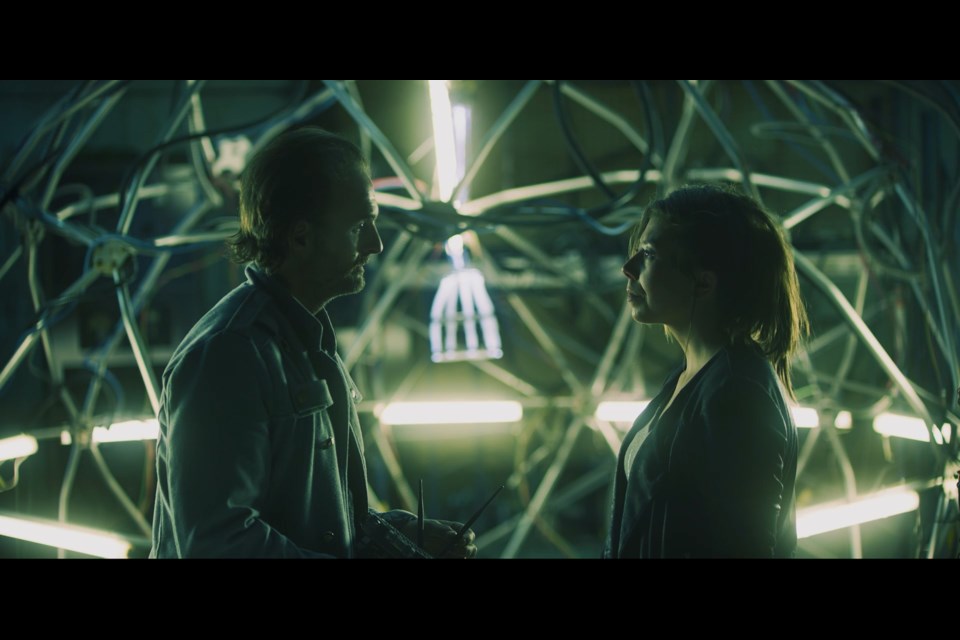BANFF – For Métis writer and director Benjamin Ross Hayden, Indigenous science fiction is an important space to tell stories inspired by his ancestors.
Hayden's second feature film Parallel Minds will be screened at the Lux Cinema in Banff on Saturday (Oct. 31) at 7 p.m. after premiering at the Calgary Film Festival in September.
"With what is going on in the world today, Indigenous futurism is an important genre and important space to tell stories looking through the tropes of science fiction with an Indigenous lens at the world we are living in today – which seems more and more like a science fiction," he said.
"The mind, our memories, our imagination – is a place of freedom and with the current events of today leading us all to be sequestered by necessity, it goes to show that the last frontier of freedom is our mind.
"To protect and fight for those freedoms, and the land, are what the Métis have fought hard for and will continue to fight hard for. That is really where this comes from, there is a lot of my ancestors in this movie."
The sci-fi thriller delves into the world of artificial intelligence and for Hayden the technology takes on the role of the trickster within the film.
"This is a way to look at artificial intelligence as a kind of force that has started to surround all of us, but is a force that we cannot see," Hayden said. "The trickster is an important figure in traditional knowledge of Indigenous people."
Parallel Minds follows researcher Margo Elson, played by Cree actress Michelle Thrush, and police detective Thomas Elliot, played by Greg Bryk, as they investigate the murder of an engineer at the tech firm Red-Eye.
The company is on the verge of developing a contact lens that records what the human eye sees to replicate memories. It uses artificially engineered intelligence known as U.R.M., which stands for universal recognition matrix.
Elson and Elliot find themselves facing their own memories as they delve deeper into the mystery and uncover the actions of the rogue digital shapeshifter they are tracking.
Hayden said memories are a place of freedom and imagination, and is where a person's ancestors and their wisdom can be found.
"The contrast of the wisdom of an ancestor being connected in a universal way to other generations is a way that the mind has been connected for thousands of years, generation to generation," he said. "The contact lens, I look at this as a technological gate that has also some cautions that should be taken.
"The film itself is a cautionary tale. Parallel Minds explores a near future where there is a revolutionary contact lens that records human memories and replicates them."
The film asks some fundamental questions for us to determine our own relationship with these technological tools. Hayden said not all technological advances are what they seem and as we adopt them, it is important to understand what freedoms we stand to lose as a result.
"Where is the receiving end of this technology," he said. "That is the fundamental question it asks. Where do all these memories that are so important and near and dear to us, where do those important things that belong to us on a personal level, where do they go and where are they processed?"
It calls into question the epicentre of that processing, which is an important metaphor for our current social media obsessed daily life. It asks whether or not it has gone too far and if we give up something, or allow ourselves to be manipulated and controlled in the process.
"Throughout the movie, detective Thomas Elliot and Margo Elson ... have many encounters with these past memories that are very strong for them," Hayden said.
"What begins to happen is they begin to be challenged by their own past and their own memories and essentially need to go deeper in order to solve what could be going wrong with this tool."
He said he was inspired to explore these questions within the context of the growth in artificial intelligence and those who question technological determinism "where the human spirit and traditional knowledge has just as much power as these new tools claim to have."
"In another sense, Parallel Minds tells another story," Hayden said. "The future is on the surface, but underneath is the presence of a Métis guardian.
"The guardian named Kookum, through her courage and teachings, she imparts a sense of courage and that courage is what the Métis fight for and have in them."
The production for Parallel Minds was based out of Calgary, with some of the scenes shot in Toronto.
His first film – The Northlander was shot in the wilderness of Alberta's badlands, while his next feature and The First Encounter was shot in the Winnipeg area.
While that film is in post-production, he is also working on a new movie to be filmed in the Banff and Jasper areas called Ice Talker.
"As a western Canadian, Métis film director and writer, I often like to set each original story in a different environment," he said. "But at the same time, what I have been developing over the past few years is a cohesion between the stories in terms of the themes and the style of always using and exploring a very distinct environment and location."
Hayden earned his bachelor's of film studies from the University of Calgary. His latest film was produced by Voice Pictures and Chaos, A Film Company.
Parallel Minds has been accepted into more than a dozen international film festivals and is being released in 18 cities and towns across Alberta, including Banff. It screens at 7 p.m. Saturday (Oct. 31) at the Lux Cinema and advanced tickets are available online.




